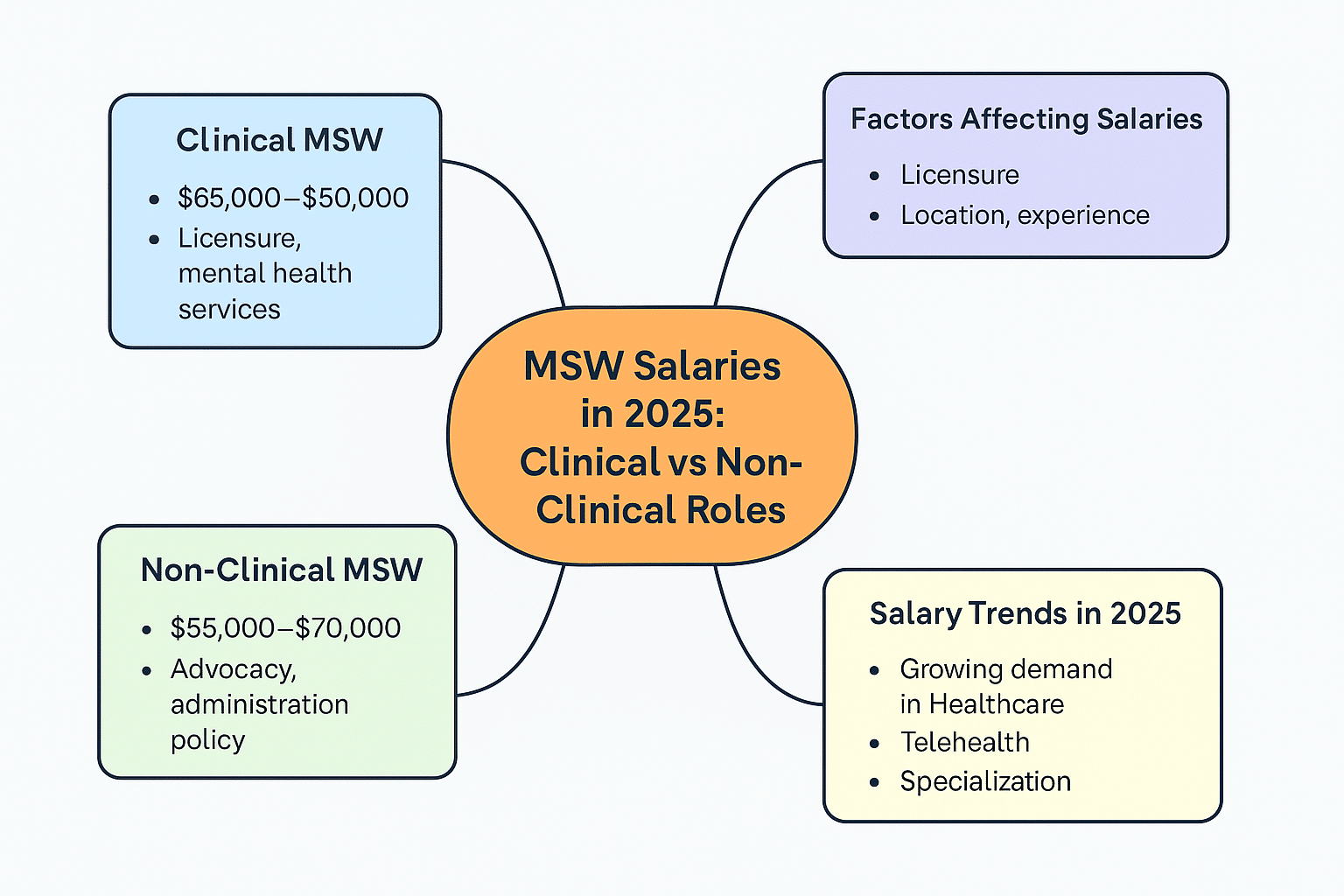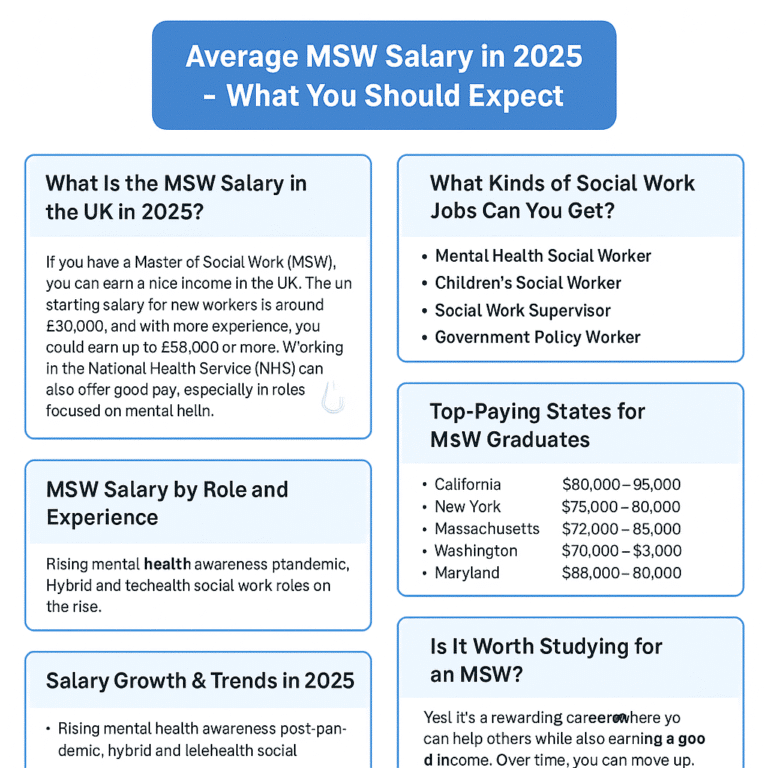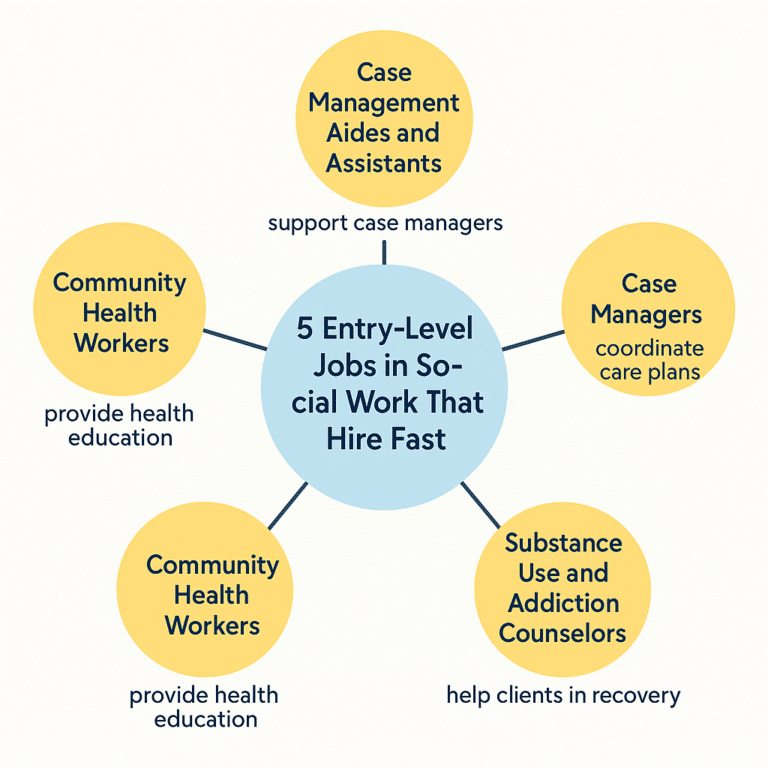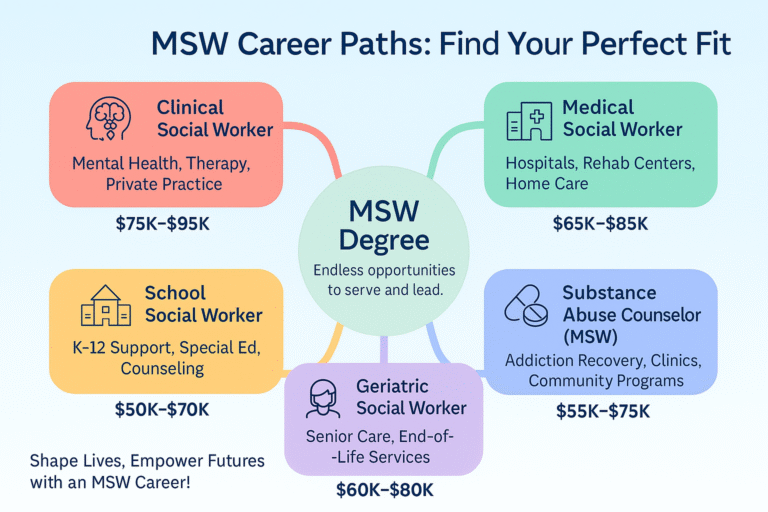MSW Salaries in 2025: Clinical vs Non-Clinical Roles

Are you thinking about getting a MSW (Master of Social Work)? Great choice! Social workers play a big role in helping people live better lives, and in 2025, many jobs in this field offer good pay. But what’s the difference between clinical and non-clinical MSW jobs? Let’s dive into the details and find out!
How Much Money Do Clinical Social Workers Make?
Clinical MSWs are licensed social workers who help people with mental health issues, stress, and other emotional challenges. These professionals can become LCSWs (Licensed Clinical Social Workers).
In 2025, the average salary for clinical MSW workers ranges from $65,000 to $85,000 per year. If you live in high-demand areas like California or New York, you might make even more!
How much does a clinical MSW make? Some professionals with LCSW licenses make over $90,000 annually in big cities.
What About Non-Clinical MSW Jobs?
Non-clinical MSW job roles don’t require a license. These social workers work behind the scenes, helping communities and organizing programs. Jobs might include Case Manager, Community Outreach Coordinator, or working in public policy.
In 2025, non-clinical MSW job roles pay between $55,000 and $70,000 annually. These positions are just as important as clinical ones, helping groups and systems grow stronger.
Does Getting a License Make a Big Difference?
Yes! Having an LCSW license can make a big difference in your salary. Clinical roles require MSW licensing and salary impact—meaning you’ll earn more when you’re licensed.
Licensed clinical social worker earnings are often 15–30% higher than non-clinical MSWs, so getting licensed is a smart move.
Suggested: Top 5 High-Paying MSW Specializations in 2025
Quick Salary Breakdown: Clinical vs Non-Clinical MSWs
| Job Type | Salary Range | License Needed | Key Focus |
| Clinical MSW | $65K–$85K | Yes (LCSW) | Therapy, mental health services |
| Non-Clinical MSW | $55K–$70K | No | Program management, policy, advocacy |
As you can see, clinical MSWs earn more, especially with a LCSW license. But non-clinical MSWs still play an important role, and their salaries are competitive too!
2025 Salary Trends in Social Work
Here are some key salary trends in social work 2025 that you should know about:
- Growing Demand in Healthcare: As more people need therapy and mental health services, MSW healthcare jobs are in high demand.
- Telehealth: Thanks to social work remote jobs 2025, clinical social workers can work from home and still earn competitive pay.
- Specialization: If you specialize in areas like trauma counseling, substance abuse, or child welfare, your earning potential increases.
- Certifications: Getting MSW certifications for high pay like trauma-informed care or substance abuse counseling can boost your salary.
Salary Influencing Factors
- Licensure Status: LCSWs earn 15–25% more than unlicensed MSWs.
- Geographic Region: Urban and coastal states tend to offer higher wages.
- Specialization: Clinical roles in healthcare and behavioral health pay more than school or community-based roles.
Sectors
- Private healthcare: Higher salaries
- Government agencies: Stable income, good benefits
- Nonprofits: Competitive, but slightly lower base pay
What’s the Outlook for MSW Jobs in 2025?
Social work is one of the fastest-growing careers in the U.S. According to the BLS (Bureau of Labor Statistics), the demand for social workers, especially in mental health services, will increase by 12% over the next decade. That means more job opportunities and higher salaries for MSW graduates.
Summary: What’s the Right Path for You?
In conclusion, whether you choose a clinical MSW or a non-clinical MSW, both paths offer rewarding careers and competitive pay. Clinical MSWs earn more on average, but non-clinical MSWs play an important role in shaping communities and policies. Now, it’s up to you! Think about your interests and long-term goals to decide which direction is best for your future. Whether you’re drawn to therapy or policy work, an MSW degree opens doors to making a difference!
FAQ
Does having an LCSW make a big difference in salary?
Yes! LCSWs often earn 15–30% more than non-clinical social workers, especially in mental health and healthcare roles.
What’s the Salary Difference Between Clinical and Non-Clinical MSW Roles in 2025?
In 2025, clinical MSW professionals earn between $65,000–$85,000 annually, depending on licensure and experience. Non-clinical MSWs typically earn $55,000–$70,000. Clinical roles generally offer higher pay due to their focus on mental health services, licensure requirements, and therapy-based work. On the other hand, non-clinical roles such as advocacy, administration, and policy work tend to have slower salary growth but offer broader opportunities for community impact.
What is the average salary for a social worker with a master’s degree?
The average salary for a social worker with a Master of Social Work (MSW) typically ranges between $50,000 and $70,000 annually, depending on factors such as location, experience, and specific job role. Clinical Social Workers (LCSWs) with a master’s degree often earn higher salaries, ranging from $60,000 to $80,000 or more.
How does an LCSW salary compare to a regular social worker salary?
An LCSW (Licensed Clinical Social Worker) generally earns more than a non-clinical social worker. On average, an LCSW salary ranges from $60,000 to $85,000, while a social worker with a general MSW (Master of Social Work) earns around $50,000 to $65,000. This difference is due to the additional clinical licensure and specialized work involved in LCSW roles.
Please Confirm It Varies based on location, license and experience.






One Comment